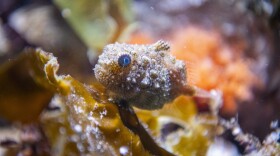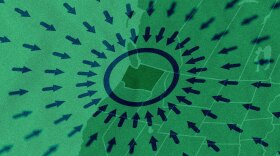Good news for fans of the Honeycrisp apple: a similar variety is being developed right here in Washington state.
Scientists at Washington State University have created a new apple variety specifically designed to thrive on the eastern slopes of the Cascades and win over consumers. It's a cross between the Honeycrisp with a variety called Enterprise, and is described as crisp and slightly sweet.
"I was very excited by it. It’s a really nice eat," says Kate Evans, an apple breeder and horticulture professor at WSU's Tree Fruit Research and Extension Center.
Fairly sweet but with some tartness, too, Evans says the new variety is comparable to the Honeycrisp. The public won't be able to taste it for several years. First the seeds must get licensed and sold, and, of course, the trees need to grow.
Years of research finally yielding fruit
This new variety — which still goes by its research name, WA-38 — took more than 15 years of breeding at the horticulture lab.
"You need a tree to be a tree before it produces a fruit," says Evans. "So every time you go through a round of propagation, you have to wait for tree to grow, and then to bear enough fruit for you to get enough material to test."
They chose seeds that would produce a bright red, crisp apple — and could be stored for 10 months and resist bruising. Those are key characteristics for the apple industry.
The WA-38 is the third variety to come out of WSU’s breeding program. The first one just recently hit the shelves under the name Crimson Delight.
Washington’s apple industry is counting on the researchers at WSU to come up with new varieties that help growers to keep up with shifting tastes of consumers. In the 1990s, the industry faced financial ruin because of its dependence on a single variety, the Red Delicious. The growers needed a federal bailout in order to recover.







